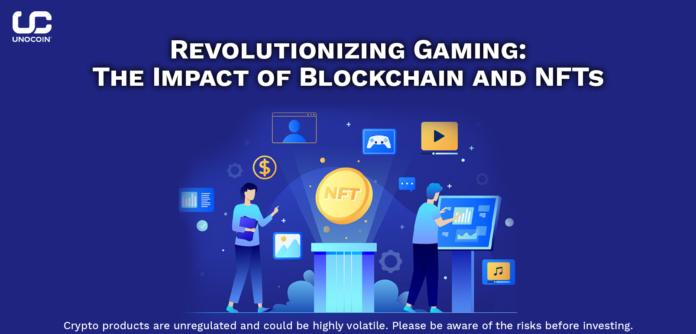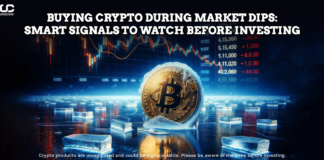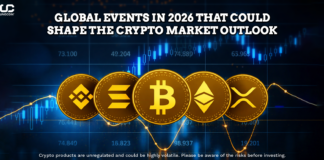Blockchain technology is revolutionizing industries worldwide, and gaming is at the forefront of this transformation. Integrating blockchain with NFTs (non-fungible tokens) is not just a passing trend, but a huge shift in how players interact with, own and trade digital assets. From decentralized asset ownership to cross-platform compatibility, the impact of blockchain and NFTs on gaming is profound. This article explores how blockchain is shaping the future of gaming, as well as its benefits, limitations, and potential long-term impacts on this growing industry.
The emergence of NFTs in games
NFTs have drastically changed the way players interact with digital property. Before NFT, in-game assets such as skins, characters, or weapons were tied to the game in which they were purchased, leaving players with no real control over their investments. Powered by blockchain, NFTs introduced a game-changing concept – allowing players to actually own these assets, which are now verifiable, scarce and portable.
With blockchain-enabled NFTs, players can now buy, sell and trade their digital assets on open marketplaces. This ownership goes beyond a single game as some NFTs can be used on different game platforms. The rise of NFTs has also brought about the Play-to-Earn (P2E) model, which allows players to earn NFTs as in-game rewards that have real-world value. This creates new economic models in gaming where virtual items can become real sources of income.
How blockchain is used in games
Blockchain brings security, transparency and decentralization to gaming and offers many advantages over traditional centralized systems. Let’s explore how blockchain is revolutionizing the gaming world:
Decentralized Asset Ownership: In traditional gaming, developers maintain full control over in-game assets. With blockchain, players gain true ownership of their assets, with the freedom to trade or sell them as they please, ensuring longevity and value beyond the lifetime of a single game.
Security and Transparency: Blockchain’s immutable ledger ensures that all in-game transactions are secure and transparent. This greatly reduces the risk of fraud, duplicate assets or cheating and creates a trusted environment for players.
Interoperability between games: One of the most interesting aspects of blockchain gaming is asset interoperability. Unlike traditional gaming, where items are locked within a specific game, blockchain allows assets such as NFTs to be used across multiple gaming platforms, creating a unified digital ecosystem for players.
Play-to-Earn Models: Blockchain integration has given rise to P2E models where players earn cryptocurrencies or NFTs through their gaming achievements. These assets can be sold or exchanged for real-world currency to create financial opportunities from gaming.
Smart Contracts: Blockchain smart contracts automate in-game transactions such as purchases and trades, eliminating the need for intermediaries and ensuring that all agreements are made transparently and securely.
Explore more: Top Telegram Tap-to-Earn Crypto Games.
Blockchain’s impact on the future of gaming
Blockchain and NFTs are not only changing the way games are played, but also the way they are developed and distributed. The shift from centralized to decentralized models is empowering players and reshaping the gaming industry as we know it.
With blockchain, players can create and control in-game economies, trade assets, and even vote on game development decisions through decentralized governance models. This opens up more community experiences that allow players to have a say in the direction of the games they love.
Additionally, blockchain gaming platforms bypass intermediaries such as app stores and allow developers to distribute their games directly to players. This decentralization reduces transaction fees and creates a smoother user experience.
Benefits and challenges of blockchain in gaming
Advantages
Real Ownership: Blockchain ensures that players retain full ownership of their game assets, giving them the freedom to trade, sell or use those assets as they see fit.
Enhanced Security and Transparency: Blockchain distributed ledger technology secures all transactions, making in-game economies transparent and fraud-proof.
New Economic Models: Play-to-earn opportunities allow players to generate real income from their in-game efforts, making gaming a viable financial endeavor.
Interoperability: The ability to transfer assets between games opens up exciting new possibilities, allowing players to use their assets in different virtual worlds.
Prompts
High Transaction Fees: Blockchain networks, especially Ethereum, are notorious for high transaction fees, which make small in-game transactions less practical for players.
Scalability Issues: As blockchains like Ethereum struggle with scalability, processing large volumes of transactions can be slow and expensive, impacting the gaming experience.
Steep learning curve: Blockchain gaming can be difficult for newcomers to understand. Setting up wallets, securing keys, and navigating decentralized platforms can discourage casual players.
Conclusion
Blockchain and NFTs are set to reshape the future of gaming, offering players unprecedented control, security and opportunities for financial gain. While issues such as transaction costs and scalability remain, the potential for a more decentralized, player-centric gaming experience is undeniable.
As blockchain technology evolves, its impact on the gaming industry will only grow, promising a future where games are more immersive, fairer and more economically rewarding for both players and developers.
For gamers and developers, blockchain integration represents a leap toward the next generation of gaming innovation—one where ownership, interoperability, and a player-driven economy define the experience.
Please find the list of authentic Unocoin accounts for all your queries below:
- Twitter: https://twitter.com/Unocoin
- Instagram: https://www.instagram.com/unocoin/
- Facebook: https://www.facebook.com/unocoin/
- LinkedIn: https://in.linkedin.com/company/unocoin
- YouTube Channel: https://www.youtube.com/c/Unocoin/videos
- Newsletter: https://medium.com/subscribe/@Unocoin_growth
- Blogs: https://blog.unocoin.com
- Telegram Group: https://t.me/Unocoin_Group
- Telegram Channel: https://t.me/+fasQhTKBsfA5N2Zl
- Telegram: https://t.me/UnocoinSupport_Bot
- E-mail id: [email protected]
- Contact details: 7788978910 (09:30 AM IST – 06:30 PM, Mon-Sat)
- App store link: https://apps.apple.com/us/app/unocoin/id1030422972?ls=1
- Playstore link: https://play.google.com/store/apps/details?id=com.unocoin.unocoinwallet
Disclaimer: Crypto products are unregulated as of this date in India. They could be highly volatile. At Unocoin, we understand that there is a need to protect consumer interests as this form of trading and investment has risks that consumers may not be aware of. To ensure that consumers who deal in crypto products are not misled, they are advised to DYOR (Do Your Own Research).







